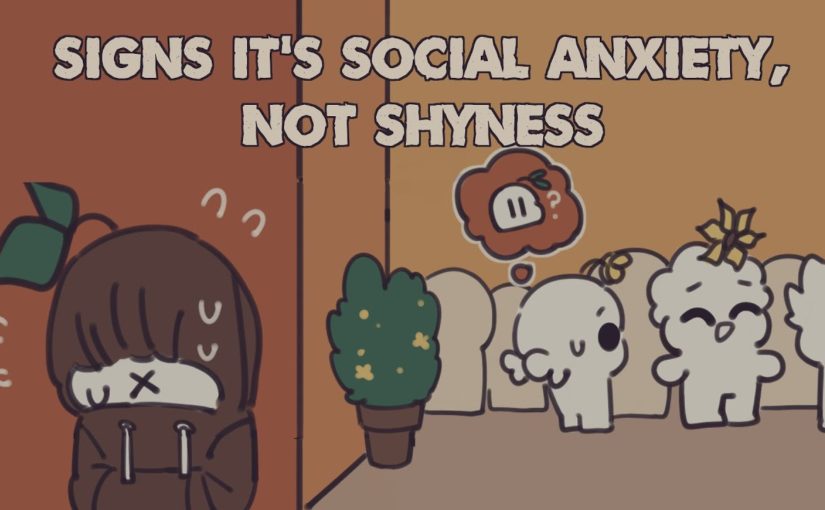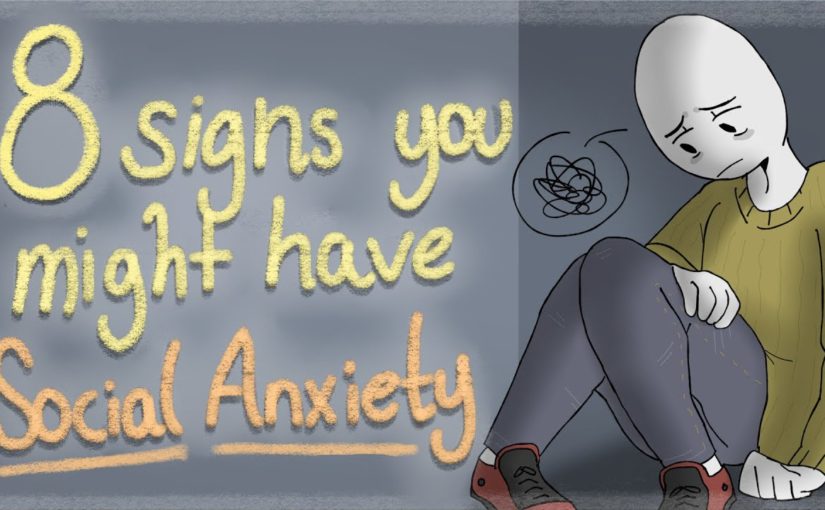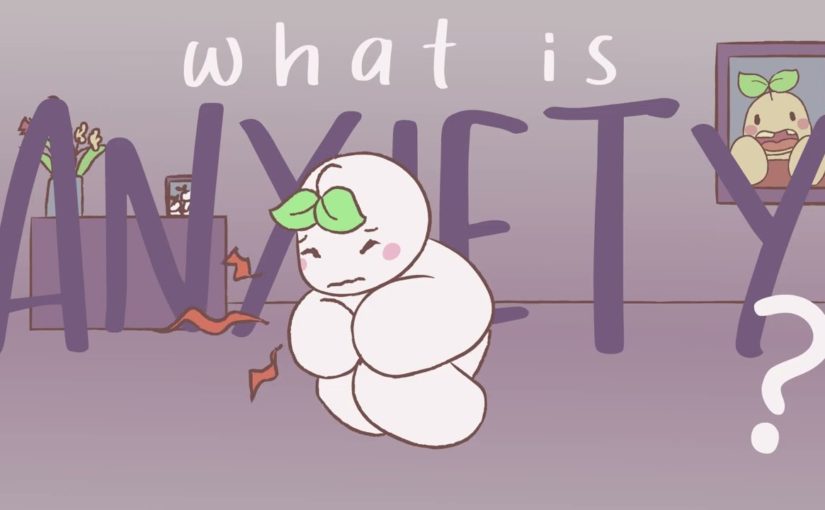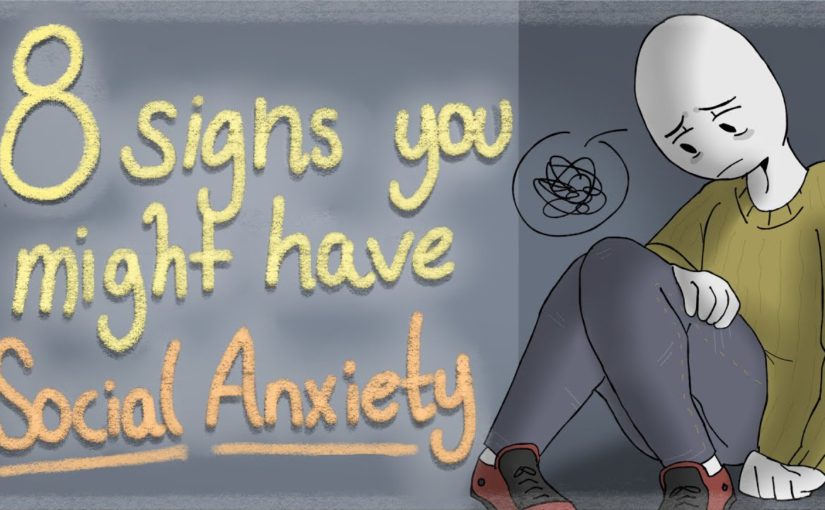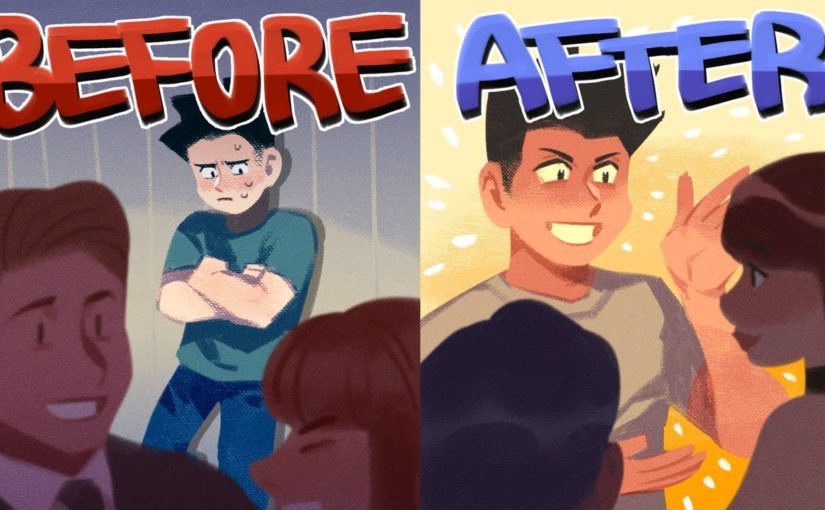 Is the mirror your trustee audience months before a public event? Before a big event, like a presentation, it’s normal to feel a bit anxious. If it’s shyness holding you back, it can diminish over a while. However, if you
experienced social anxiety, you might think for months about all the things that could go wrong. In some cases, these thoughts can accumulate in your mind and lead you to avoid
the event or situation. This behavior can be particularly damaging if it’s school or work-related. Having an honest support system can help alleviate the
worst of the jitters. Number six, a past
negative social experience. Is there a rigid memory of things going awry in a social setting? When you first experience a setback at a social event, it tends to take root in you in the form of dread. However, if it was just shyness, the next time you encounter such a setting and come out unscathed, some of that dread chips away. But when you’re socially anxious, no amount of chipping away is sufficient. You are always expecting the worst possible consequences. You lose interest in even working on basic social skills. Although the definitive cause for social anxiety is unknown, researchers believe that
underdeveloped social skills can lead to social anxiety. Being teased or bullied for being socially awkward can lead you to fear
further social interactions and exacerbate social anxiety. And number seven, spending time after a social situation analyzing your performance and identifying flaws
in your interactions. Do you mull over conversations
way into the night? Are you constantly thinking up how you should have responded long after the topic is over? Sometimes we revisit past moments to learn from them and become better. But obsessing over a past detail usually ends with insecurities creeping out from the corners of your mind to make you feel inferior. However, for someone with social anxiety, obsessing over a small detail does not feel like a choice. Social anxiety is about seeing yourself through the lens of someone else. Hence, you might be prone to dwelling on and analyzing past interactions, especially conversations. The trigger is in the part of the conversation that you keep replaying. Only when you figure out a better response can you let it go. Letting go is a difficult step and it might take some time to learn. Everyone experiences
anxiety to varying degrees. Hence, professional advice tailored to meet individual needs is essential to ensure positive results. Your apprehensions are by no means a reason for you to
swear off from society. By seeking appropriate support and help, you can soon view the outside world as your conquered battlefield. Have you ever had the two mixed? What has helped you cope
with social anxiety? Feel free to leave a comment down below with your thoughts,
experiences, or suggestions. If you found this video helpful, be sure to hit the like button and share it with those out there, pondering the two. Don’t forget to subscribe to Psych2Go and hit the notification
bell for more new videos. Thanks for watching.As found on YouTubeShow me the simple steps to overcome shyness & cure social anxiety ➫ The Shyness and Social Anxiety System was created by Sean Cooper, a former social anxiety sufferer. Learn how to overcome your quietness, erase your insecurities and be confident around people using proven psychology.
Is the mirror your trustee audience months before a public event? Before a big event, like a presentation, it’s normal to feel a bit anxious. If it’s shyness holding you back, it can diminish over a while. However, if you
experienced social anxiety, you might think for months about all the things that could go wrong. In some cases, these thoughts can accumulate in your mind and lead you to avoid
the event or situation. This behavior can be particularly damaging if it’s school or work-related. Having an honest support system can help alleviate the
worst of the jitters. Number six, a past
negative social experience. Is there a rigid memory of things going awry in a social setting? When you first experience a setback at a social event, it tends to take root in you in the form of dread. However, if it was just shyness, the next time you encounter such a setting and come out unscathed, some of that dread chips away. But when you’re socially anxious, no amount of chipping away is sufficient. You are always expecting the worst possible consequences. You lose interest in even working on basic social skills. Although the definitive cause for social anxiety is unknown, researchers believe that
underdeveloped social skills can lead to social anxiety. Being teased or bullied for being socially awkward can lead you to fear
further social interactions and exacerbate social anxiety. And number seven, spending time after a social situation analyzing your performance and identifying flaws
in your interactions. Do you mull over conversations
way into the night? Are you constantly thinking up how you should have responded long after the topic is over? Sometimes we revisit past moments to learn from them and become better. But obsessing over a past detail usually ends with insecurities creeping out from the corners of your mind to make you feel inferior. However, for someone with social anxiety, obsessing over a small detail does not feel like a choice. Social anxiety is about seeing yourself through the lens of someone else. Hence, you might be prone to dwelling on and analyzing past interactions, especially conversations. The trigger is in the part of the conversation that you keep replaying. Only when you figure out a better response can you let it go. Letting go is a difficult step and it might take some time to learn. Everyone experiences
anxiety to varying degrees. Hence, professional advice tailored to meet individual needs is essential to ensure positive results. Your apprehensions are by no means a reason for you to
swear off from society. By seeking appropriate support and help, you can soon view the outside world as your conquered battlefield. Have you ever had the two mixed? What has helped you cope
with social anxiety? Feel free to leave a comment down below with your thoughts,
experiences, or suggestions. If you found this video helpful, be sure to hit the like button and share it with those out there, pondering the two. Don’t forget to subscribe to Psych2Go and hit the notification
bell for more new videos. Thanks for watching.As found on YouTubeShow me the simple steps to overcome shyness & cure social anxiety ➫ The Shyness and Social Anxiety System was created by Sean Cooper, a former social anxiety sufferer. Learn how to overcome your quietness, erase your insecurities and be confident around people using proven psychology.7 Signs It’s Social Anxiety, Not Shyness
(light upbeat music) – [Narrator] Hello,
Psych2Goers and welcome back. All right, so how do you know it’s a disorder and not a trait? Who wouldn’t be a bit awkward when walking into a
room full of strangers? Shyness is a trait. It’s the initial awkwardness that precedes forced small talk. The mere dislike of the spotlight, but it’s not distressing. Social anxiety, on the other hand, is the pervasive, intense fear of being judged, humiliated, rejected, or embarrassed in a social setting that leads to anxiety or avoidance. Although shyness and social anxiety share similar physical symptomatology, some traits differentiate them. And please remember this video is meant to be informative and should not be used as a rubric for self-diagnosis. If you have any personal questions or concerns regarding this topic, please consult a licensed professional. With that said, here are seven signs
that you’re not just shy. Number one, avoiding or
escaping very public settings. When you find yourself
in new surroundings, do you open up after a while or stick to a familiar group of people? Or maybe a bathroom nearby or leaving early seems
like a better sanctuary? Although a shy person
may feel uncomfortable at a party where they don’t know anyone, someone with social anxiety will avoid public settings altogether. This symptom can devolve into agoraphobia. Public situations such as dining out at a restaurant, dating, or returning an item to a store can be harrowing for someone with an anxiety disorder, where there are opportunities for rejection or embarrassment. If avoidance is not possible, those who have social anxiety may try to escape the whole situation by using extreme avoidance and escapist tactics or safety behaviors. The problem with safety behaviors is that they provide the illusion of surviving the event. However, you still feel guilty for not controlling your anxiety. Number two is feeling very
self-conscious in front of others. Do public settings make
you feel uncomfortable? Does it feel as though people are watching and judging you? You might not even have
everyone’s attention, yet you still have an inexplicable fear that at some point something will happen and everyone will start judging you. To someone who doesn’t
suffer from social anxiety, this might sound illogical, but that’s the thing. Social anxieties sometimes
don’t have logic. They can arise at the most random moment and make you suddenly feel as though the spotlight has fallen on you. Some physical symptoms involve sweating, heart palpitations,
and panic attacks. Number three is fear of physical symptoms that may cause you embarrassment. Can you feel a certain
set of physical symptoms kicking in as soon as you step out? Do you constantly cool your burning cheeks with the back of your hands? One way social anxiety can pass shyness is through physical cues. Both have physiological similarities such as blushing, sweating,
rigid posture, and trembling. However, for someone with social anxiety, their bodily response
can make them anxious. These physical symptoms add to the workload of
stepping out into society. You constantly worry about how others might judge you for displaying these outward symptoms. Even having your mind go
blank for a few seconds can make you feel like you left a poor impression. Number four, fear that others will notice that you look anxious. Are you quick to avert your
eyes after a quick greeting? Are you more comfortable looking around while interacting with others? While shyness can be the
initial driving force, it wears off with time to the point that you become comfortable holding steady eye contact. On the contrary, social anxiety does not wear away after the first
few moments of interaction. As you feel its presence, all the while you are reluctant to engage in open interaction. Since your social anxiety is a tangible experience for you, you fear that it’s also noticeable for those around you. Thus, producing more anxiety. Number five, having
anxiety in anticipation of a feared activity or event. Is the mirror your trustee audience months before a public event? Before a big event, like a presentation, it’s normal to feel a bit anxious. If it’s shyness holding you back, it can diminish over a while. However, if you
experienced social anxiety, you might think for months about all the things that could go wrong. In some cases, these thoughts can accumulate in your mind and lead you to avoid
the event or situation. This behavior can be particularly damaging if it’s school or work-related. Having an honest support system can help alleviate the
worst of the jitters. Number six, a past
negative social experience. Is there a rigid memory of things going awry in a social setting? When you first experience a setback at a social event, it tends to take root in you in the form of dread. However, if it was just shyness, the next time you encounter such a setting and come out unscathed, some of that dread chips away. But when you’re socially anxious, no amount of chipping away is sufficient. You are always expecting the worst possible consequences. You lose interest in even working on basic social skills. Although the definitive cause for social anxiety is unknown, researchers believe that
underdeveloped social skills can lead to social anxiety. Being teased or bullied for being socially awkward can lead you to fear
further social interactions and exacerbate social anxiety. And number seven, spending time after a social situation analyzing your performance and identifying flaws
in your interactions. Do you mull over conversations
way into the night? Are you constantly thinking up how you should have responded long after the topic is over? Sometimes we revisit past moments to learn from them and become better. But obsessing over a past detail usually ends with insecurities creeping out from the corners of your mind to make you feel inferior. However, for someone with social anxiety, obsessing over a small detail does not feel like a choice. Social anxiety is about seeing yourself through the lens of someone else. Hence, you might be prone to dwelling on and analyzing past interactions, especially conversations. The trigger is in the part of the conversation that you keep replaying. Only when you figure out a better response can you let it go. Letting go is a difficult step and it might take some time to learn. Everyone experiences
anxiety to varying degrees. Hence, professional advice tailored to meet individual needs is essential to ensure positive results. Your apprehensions are by no means a reason for you to
swear off from society. By seeking appropriate support and help, you can soon view the outside world as your conquered battlefield. Have you ever had the two mixed? What has helped you cope
with social anxiety? Feel free to leave a comment down below with your thoughts,
experiences, or suggestions. If you found this video helpful, be sure to hit the like button and share it with those out there, pondering the two. Don’t forget to subscribe to Psych2Go and hit the notification
bell for more new videos. Thanks for watching.As found on YouTubeShow me the simple steps to overcome shyness & cure social anxiety ➫ The Shyness and Social Anxiety System was created by Sean Cooper, a former social anxiety sufferer. Learn how to overcome your quietness, erase your insecurities and be confident around people using proven psychology.
Is the mirror your trustee audience months before a public event? Before a big event, like a presentation, it’s normal to feel a bit anxious. If it’s shyness holding you back, it can diminish over a while. However, if you
experienced social anxiety, you might think for months about all the things that could go wrong. In some cases, these thoughts can accumulate in your mind and lead you to avoid
the event or situation. This behavior can be particularly damaging if it’s school or work-related. Having an honest support system can help alleviate the
worst of the jitters. Number six, a past
negative social experience. Is there a rigid memory of things going awry in a social setting? When you first experience a setback at a social event, it tends to take root in you in the form of dread. However, if it was just shyness, the next time you encounter such a setting and come out unscathed, some of that dread chips away. But when you’re socially anxious, no amount of chipping away is sufficient. You are always expecting the worst possible consequences. You lose interest in even working on basic social skills. Although the definitive cause for social anxiety is unknown, researchers believe that
underdeveloped social skills can lead to social anxiety. Being teased or bullied for being socially awkward can lead you to fear
further social interactions and exacerbate social anxiety. And number seven, spending time after a social situation analyzing your performance and identifying flaws
in your interactions. Do you mull over conversations
way into the night? Are you constantly thinking up how you should have responded long after the topic is over? Sometimes we revisit past moments to learn from them and become better. But obsessing over a past detail usually ends with insecurities creeping out from the corners of your mind to make you feel inferior. However, for someone with social anxiety, obsessing over a small detail does not feel like a choice. Social anxiety is about seeing yourself through the lens of someone else. Hence, you might be prone to dwelling on and analyzing past interactions, especially conversations. The trigger is in the part of the conversation that you keep replaying. Only when you figure out a better response can you let it go. Letting go is a difficult step and it might take some time to learn. Everyone experiences
anxiety to varying degrees. Hence, professional advice tailored to meet individual needs is essential to ensure positive results. Your apprehensions are by no means a reason for you to
swear off from society. By seeking appropriate support and help, you can soon view the outside world as your conquered battlefield. Have you ever had the two mixed? What has helped you cope
with social anxiety? Feel free to leave a comment down below with your thoughts,
experiences, or suggestions. If you found this video helpful, be sure to hit the like button and share it with those out there, pondering the two. Don’t forget to subscribe to Psych2Go and hit the notification
bell for more new videos. Thanks for watching.As found on YouTubeShow me the simple steps to overcome shyness & cure social anxiety ➫ The Shyness and Social Anxiety System was created by Sean Cooper, a former social anxiety sufferer. Learn how to overcome your quietness, erase your insecurities and be confident around people using proven psychology.
 Is the mirror your trustee audience months before a public event? Before a big event, like a presentation, it’s normal to feel a bit anxious. If it’s shyness holding you back, it can diminish over a while. However, if you
experienced social anxiety, you might think for months about all the things that could go wrong. In some cases, these thoughts can accumulate in your mind and lead you to avoid
the event or situation. This behavior can be particularly damaging if it’s school or work-related. Having an honest support system can help alleviate the
worst of the jitters. Number six, a past
negative social experience. Is there a rigid memory of things going awry in a social setting? When you first experience a setback at a social event, it tends to take root in you in the form of dread. However, if it was just shyness, the next time you encounter such a setting and come out unscathed, some of that dread chips away. But when you’re socially anxious, no amount of chipping away is sufficient. You are always expecting the worst possible consequences. You lose interest in even working on basic social skills. Although the definitive cause for social anxiety is unknown, researchers believe that
underdeveloped social skills can lead to social anxiety. Being teased or bullied for being socially awkward can lead you to fear
further social interactions and exacerbate social anxiety. And number seven, spending time after a social situation analyzing your performance and identifying flaws
in your interactions. Do you mull over conversations
way into the night? Are you constantly thinking up how you should have responded long after the topic is over? Sometimes we revisit past moments to learn from them and become better. But obsessing over a past detail usually ends with insecurities creeping out from the corners of your mind to make you feel inferior. However, for someone with social anxiety, obsessing over a small detail does not feel like a choice. Social anxiety is about seeing yourself through the lens of someone else. Hence, you might be prone to dwelling on and analyzing past interactions, especially conversations. The trigger is in the part of the conversation that you keep replaying. Only when you figure out a better response can you let it go. Letting go is a difficult step and it might take some time to learn. Everyone experiences
anxiety to varying degrees. Hence, professional advice tailored to meet individual needs is essential to ensure positive results. Your apprehensions are by no means a reason for you to
swear off from society. By seeking appropriate support and help, you can soon view the outside world as your conquered battlefield. Have you ever had the two mixed? What has helped you cope
with social anxiety? Feel free to leave a comment down below with your thoughts,
experiences, or suggestions. If you found this video helpful, be sure to hit the like button and share it with those out there, pondering the two. Don’t forget to subscribe to Psych2Go and hit the notification
bell for more new videos. Thanks for watching.As found on YouTubeShow me the simple steps to overcome shyness & cure social anxiety ➫ The Shyness and Social Anxiety System was created by Sean Cooper, a former social anxiety sufferer. Learn how to overcome your quietness, erase your insecurities and be confident around people using proven psychology.
Is the mirror your trustee audience months before a public event? Before a big event, like a presentation, it’s normal to feel a bit anxious. If it’s shyness holding you back, it can diminish over a while. However, if you
experienced social anxiety, you might think for months about all the things that could go wrong. In some cases, these thoughts can accumulate in your mind and lead you to avoid
the event or situation. This behavior can be particularly damaging if it’s school or work-related. Having an honest support system can help alleviate the
worst of the jitters. Number six, a past
negative social experience. Is there a rigid memory of things going awry in a social setting? When you first experience a setback at a social event, it tends to take root in you in the form of dread. However, if it was just shyness, the next time you encounter such a setting and come out unscathed, some of that dread chips away. But when you’re socially anxious, no amount of chipping away is sufficient. You are always expecting the worst possible consequences. You lose interest in even working on basic social skills. Although the definitive cause for social anxiety is unknown, researchers believe that
underdeveloped social skills can lead to social anxiety. Being teased or bullied for being socially awkward can lead you to fear
further social interactions and exacerbate social anxiety. And number seven, spending time after a social situation analyzing your performance and identifying flaws
in your interactions. Do you mull over conversations
way into the night? Are you constantly thinking up how you should have responded long after the topic is over? Sometimes we revisit past moments to learn from them and become better. But obsessing over a past detail usually ends with insecurities creeping out from the corners of your mind to make you feel inferior. However, for someone with social anxiety, obsessing over a small detail does not feel like a choice. Social anxiety is about seeing yourself through the lens of someone else. Hence, you might be prone to dwelling on and analyzing past interactions, especially conversations. The trigger is in the part of the conversation that you keep replaying. Only when you figure out a better response can you let it go. Letting go is a difficult step and it might take some time to learn. Everyone experiences
anxiety to varying degrees. Hence, professional advice tailored to meet individual needs is essential to ensure positive results. Your apprehensions are by no means a reason for you to
swear off from society. By seeking appropriate support and help, you can soon view the outside world as your conquered battlefield. Have you ever had the two mixed? What has helped you cope
with social anxiety? Feel free to leave a comment down below with your thoughts,
experiences, or suggestions. If you found this video helpful, be sure to hit the like button and share it with those out there, pondering the two. Don’t forget to subscribe to Psych2Go and hit the notification
bell for more new videos. Thanks for watching.As found on YouTubeShow me the simple steps to overcome shyness & cure social anxiety ➫ The Shyness and Social Anxiety System was created by Sean Cooper, a former social anxiety sufferer. Learn how to overcome your quietness, erase your insecurities and be confident around people using proven psychology.